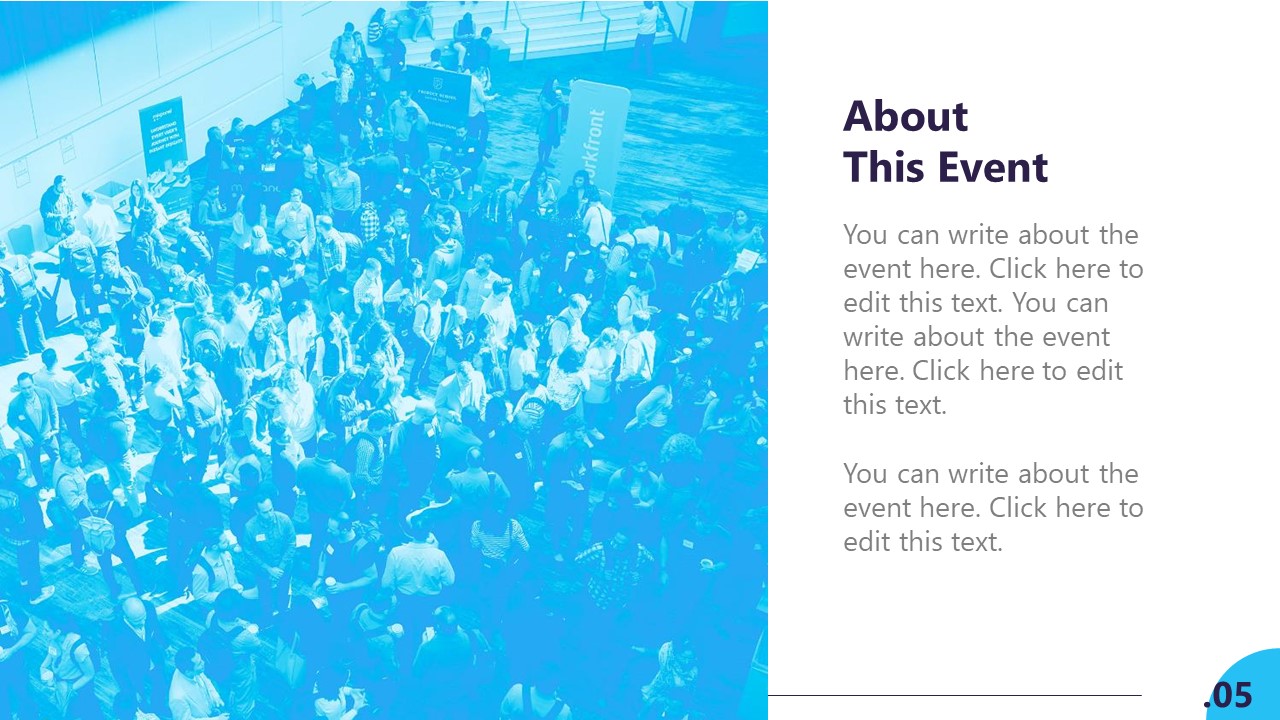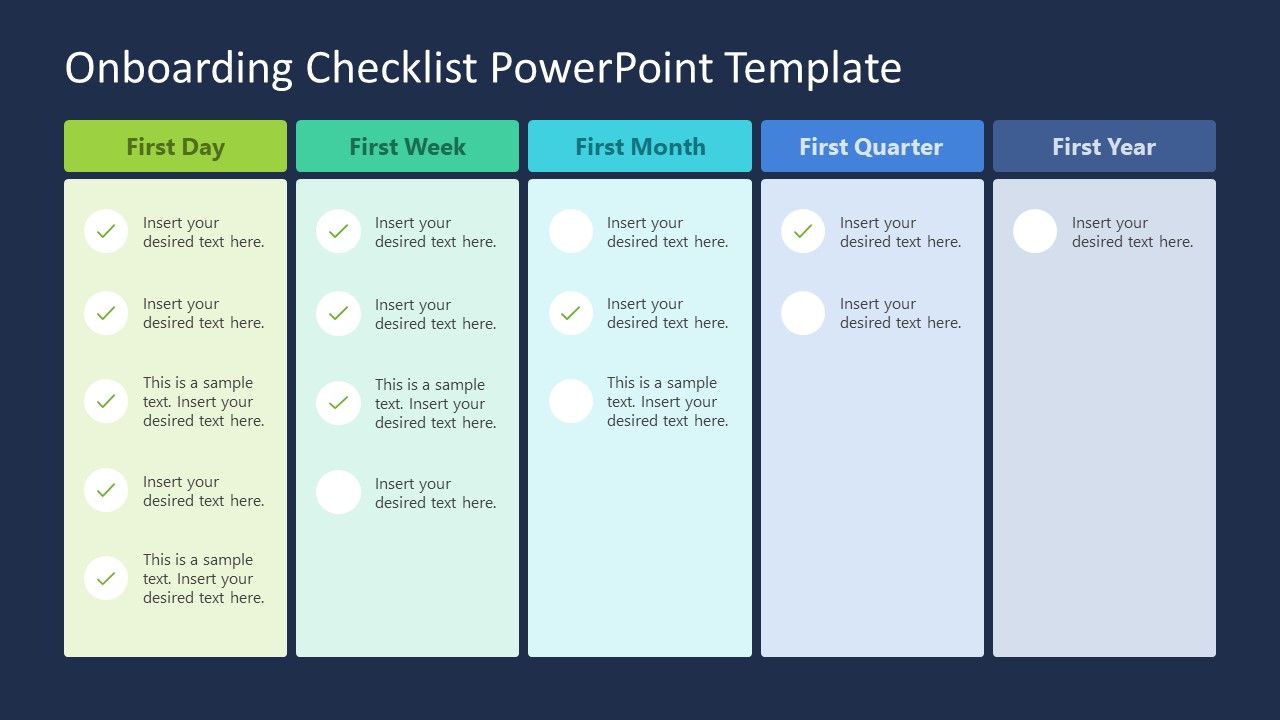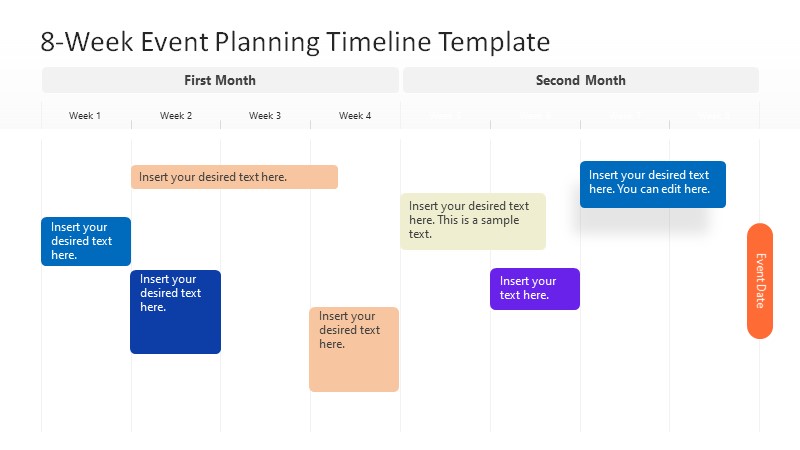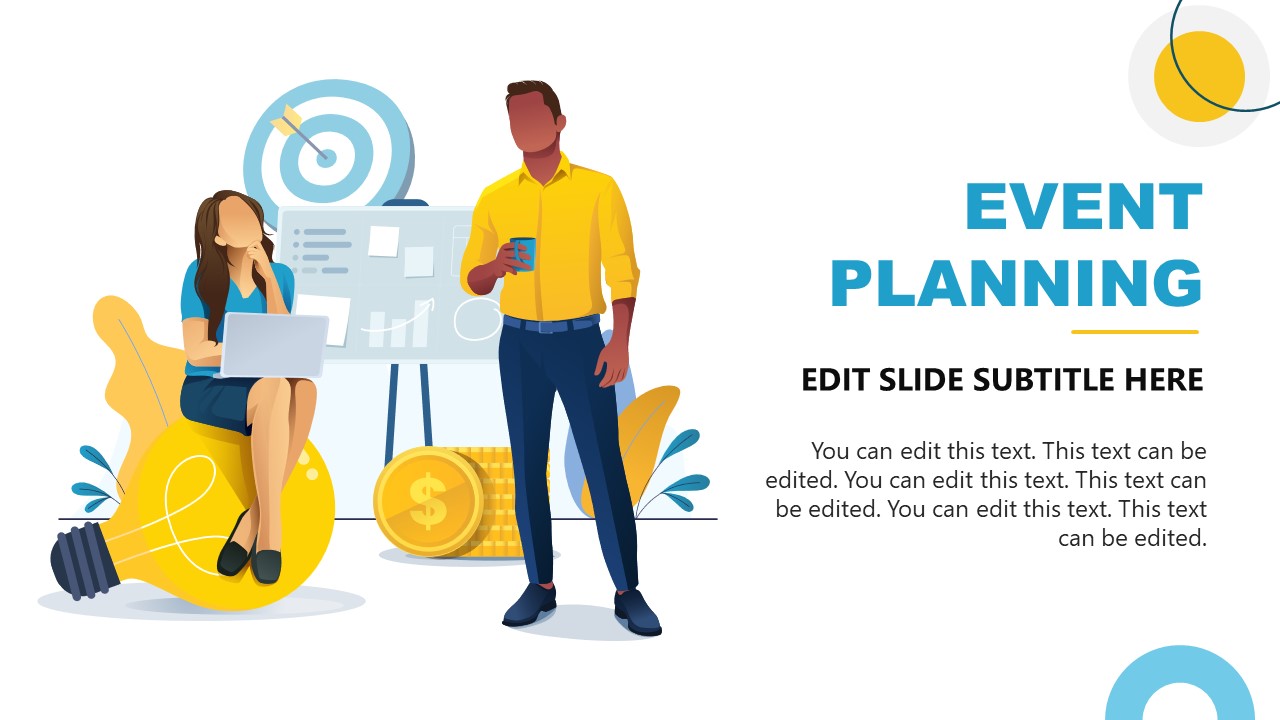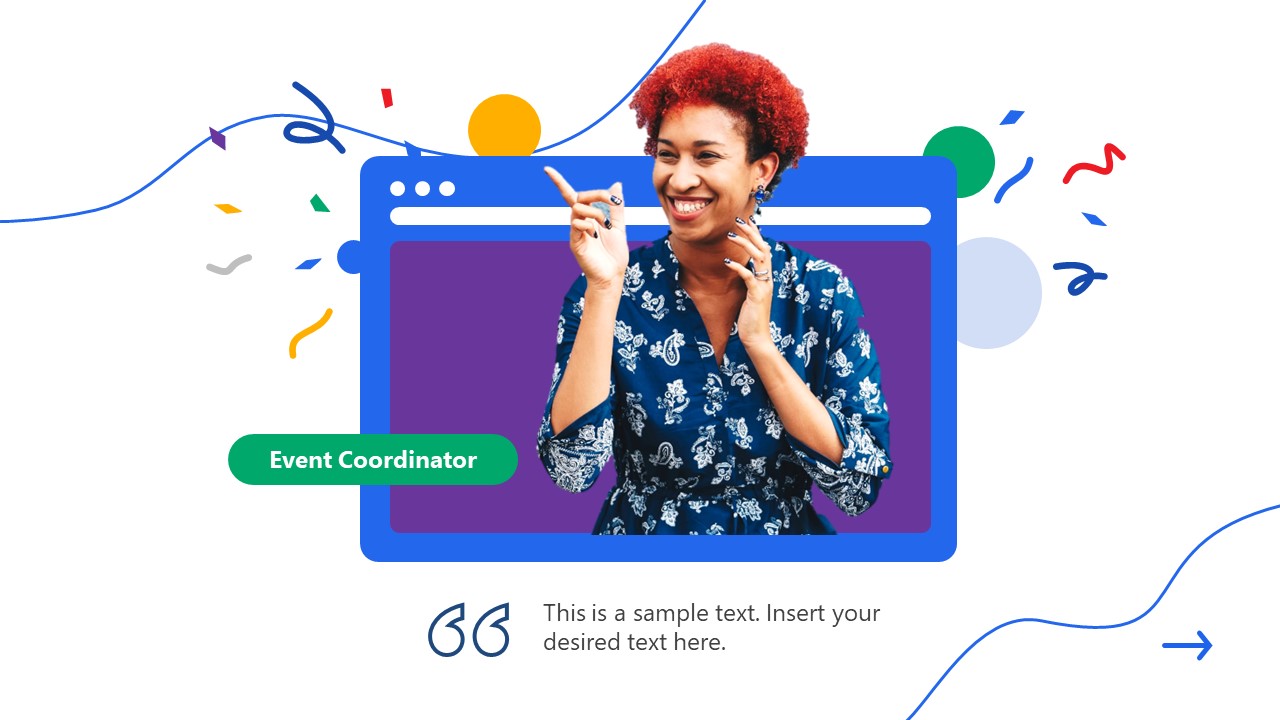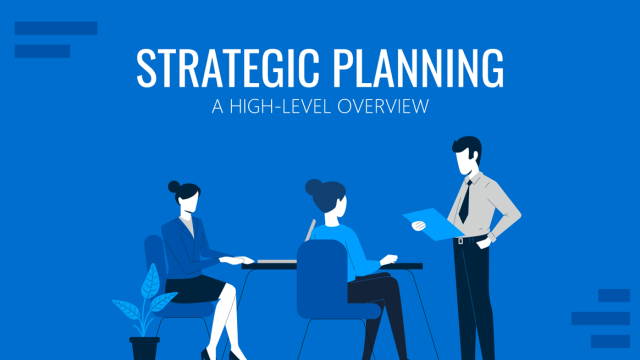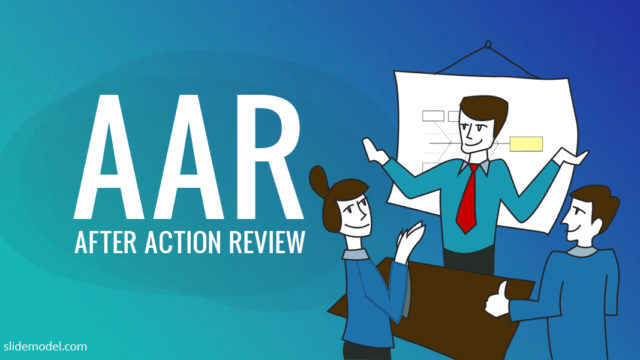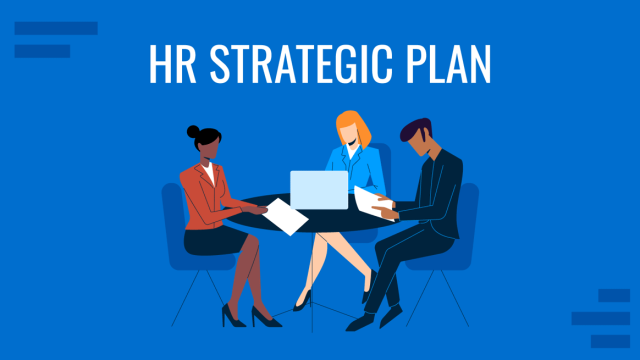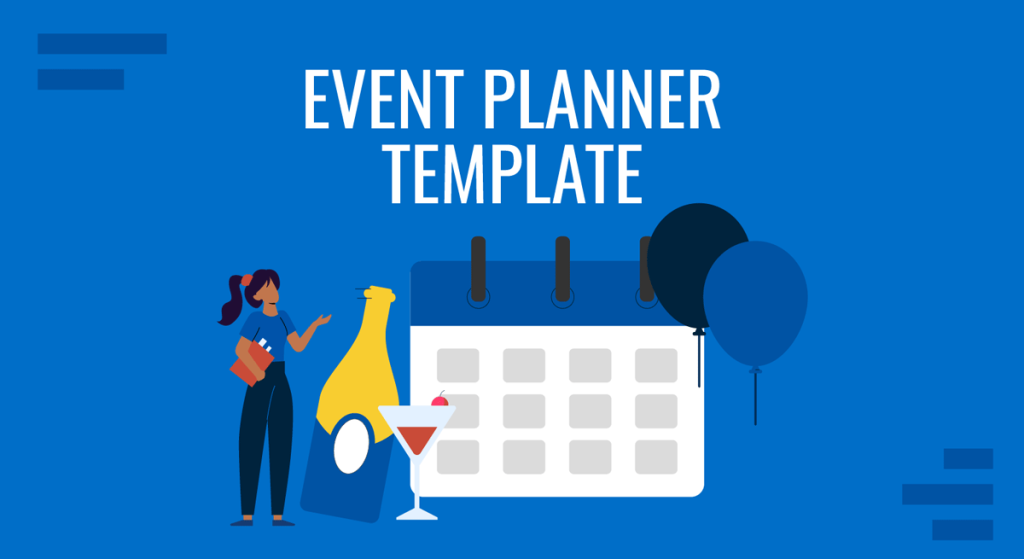
According to Allied Market Research, the events industry is projected to reach a staggering $1,552.9 billion by 2028. As the industry continues to thrive, event planners face the challenge of delivering memorable experiences while efficiently managing various aspects of the planning process.
Whether you organize a corporate conference, a manufacturing tradeshow, or a leadership seminar, the key to success lies in effective event planning. And one tool that has proven invaluable in achieving this success is event plan templates.
In this guide, we delve into the world of event planning while exploring the vital role that event plan templates play in supporting and streamlining the planning process.
Regardless of the nature or scale of your event, incorporating these templates into your workflow can enhance your productivity, ensure consistency, and mitigate potential risks.
Table of Contents
- What is Event Planning?
- What Constitutes Event Planning?
- What are Event Planning Templates?
- Case Study: Business Conference Event Plan
- Design and Plan Successful Events Every Time
What is Event Planning?
Event planning is the process of conceptualizing and designing an event. The practice consists of coordinating all the details for an event of any type; meetings, conventions, trade shows, ceremonies, etc.
Event planning is part of event management and focuses on all pre-event stages, including strategy, concept development, and detailed planning. In contrast, event management itself deals primarily with the execution and operational aspect during the event itself.
The primary output of an event planning process is an event plan that will guide the event management team to prepare and coordinate a successful event. Sometimes, the first output is an event plan proposal that needs approval before becoming a complete event plan.
The case study at the end of this article is an event plan proposal.
Types of Business Events
Business events are either internal for the company’s employees and stakeholders or external and aimed at other businesses or potential clients.
Here are some of the most common types of business events.
Business Conferences
Conferences bring together professionals to exchange knowledge and discuss a particular subject in panel discussions and workshops.
Trade Shows
Trade shows allow companies to showcase products or services to a targeted audience in specialized booths.
Seminars
Seminars are educational events focused on specific topics or industries through expert presentations and interactive discussions.
Product Launches
Product launches are events introducing new products or services to the market, creating buzz, and generating media coverage.
Team-Building Activities
Team-building events strengthen bonds and enhance employee collaboration with games and problem-solving challenges.
Networking Events
Networking events provide a platform for professionals to connect, build relationships, and expand their professional network.
Award Ceremonies
Award ceremonies recognize and celebrate the excellence of individuals or teams in various fields by acknowledging outstanding achievements.
Charity Functions
A charity function primarily aims to raise funds, create awareness, and support charitable causes by gathering donations.
What Constitutes Event Planning?
Event planning involves a comprehensive approach that starts with defining an event purpose and culminates in an event plan proposal or event plan.
Along every step of the event planning process, event planners use PowerPoint templates to help the team stay on track and plan effectively.
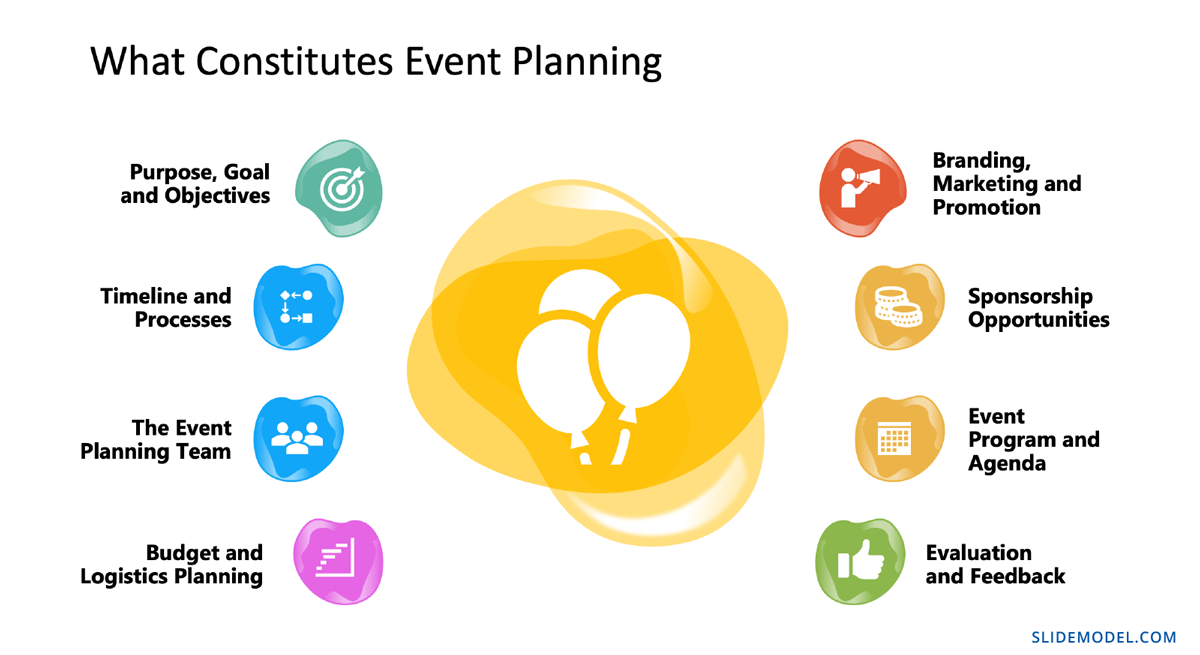
Purpose, Goal, and Objectives
An event’s purpose is the overarching reason why the event will take place. The goal fulfills the purpose, and the objectives achieve the goal.
To determine the event purpose, answer the 5W1H; Who, What, When, Where, Why, and How. Define a SMART event goal using the SMART framework, and write the objectives precisely as they will fulfill the event goal.
Here are two templates to help you:
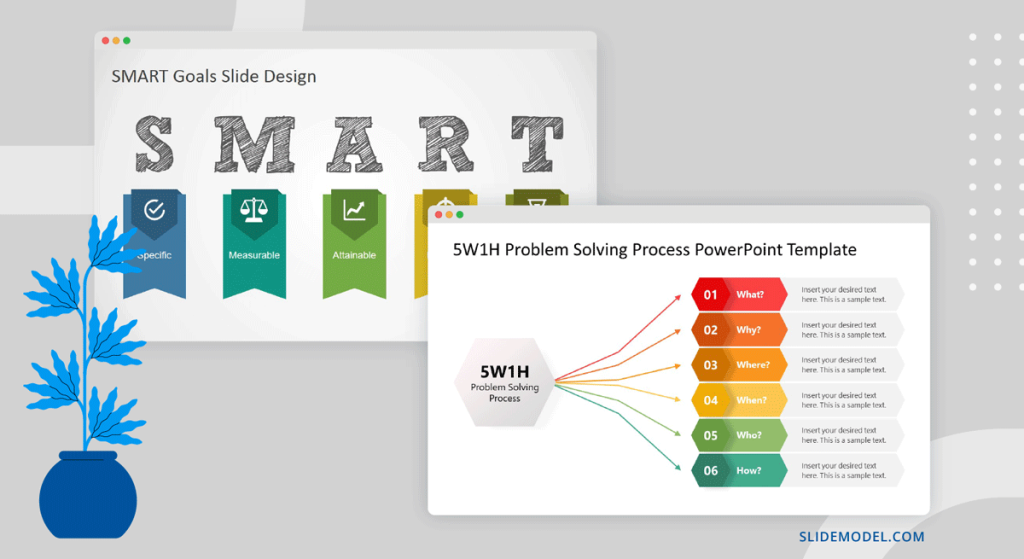
You’ll see how all three (purpose, goal, and objectives) work together in the case study at the end of this article.
Answering the 5W1H also helps identify the target audience for the event. Use a persona analysis template to define how to conceptualize the event in a way that will positively impact them.
Timeline and Processes
The event planning process needs transparent processes to keep everything on track. These processes all have templates you can use:
- A roadmap to define key milestones and deadlines.
- A work breakdown structure to outline all the tasks and action items.
- A communication plan for transparent communication processes between team members or the team and the client.
- Schedules and agendas to organize all event planning meetings.
Here are two Event Planning PPT templates to help you:
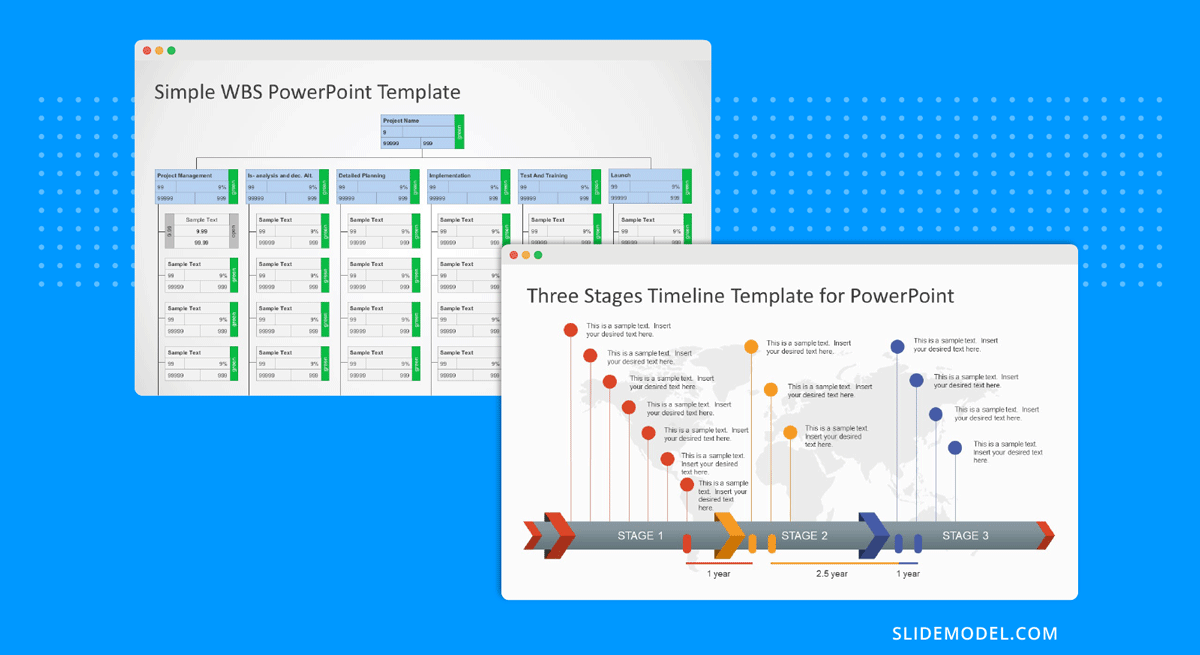
The Event Planning Team
All events need a team to cover all planning tasks effectively. Depending on the event’s magnitude, some roles listed below will require a subteam.
- An Event Director with ultimate decision power.
- An Event Coordinator is responsible for day-to-day admin work.
- A Financial Coordinator in charge of the budget and allocation of monetary resources.
- A Marketing/Communications Director in charge of marketing campaigns.
- A Technical Director to oversee all audio, video, and media tasks.
- A Creative Director oversees all visual aspects like a website, invitations, signage, and more.
Budget + Logistics Planning
Budget and logistics in event planning consist of minute details that must be tracked, confirmed, and completed. Typically, budget and logistics are managed with spreadsheet and checklist templates.
Budget planning includes the following analyses:
- A budget forecast with a projection of fixed and variable costs. Fixed costs are the ones that won’t change, and variable costs will go up or down depending on the circumstances.
- The expenses sheet includes food & beverage, team, staff, decor, travel, marketing, venue rental, streaming flatforms, tech, etc.
- Revenue sources sheet including advertising revenues, concession, booth rental fees, registration, and sponsorship.
- A contingency fund in case of unforeseen circumstances.
Logistics planning includes:
- Finding a venue.
- Hiring vendors.
- Negotiatinsterms and signing contracts.
- Defining speaker availability.
- Organizing flights, transport, and accommodation.
- Receiving booth applications.
- Minding health & safety protocols
Branding, Marketing, and Promotion
Internal and external events have different branding, marketing, and promotion requirements. It all depends on the event’s purpose and magnitude.
Event branding uses company brand guidelines to direct all visual communication and assets for the event. These include simple elements like the logo, colors, and fonts to what style of imagery to use or what type of messaging is incorporated. Typically, event branding is used for both internal and external business events.
Event marketing and promotion are generally used for external events that sell tickets, sponsorship opportunities, and other marketable event aspects. But occasionally, an internal event will use promotion techniques to remind employees about the event weeks or days beforehand.
Sponsorship Opportunities
Some events offer sponsorship opportunities for businesses to provide funds in exchange for something valuable that will benefit both the sponsor and the event attendees.
These are the most common types of event sponsorship:
- Financial: Purely monetary help offered as a deposit to the event planning committee or payment of one of the event logistic necessities; food, wifi, venue.
- In-Kind: The sponsor offers their services or products for free.
- Media: Promotional help about the event on different media outlets; social media, television, radio, etc.
- Promotional: Influencers, bloggers, writers, and others promoting the event on communication channels.
- Packages: Businesses pay a set amount for several brand highlight opportunities in the event; a logo in the poster, a banner in the venue, a speaking slot, etc.
Event Program and Agenda
The event program and agenda detail all the activities during the event. Your event program can be designed as a schedule with detailed times, presenter or facilitator details, or more creative compositions that inspire attendees throughout the day.
Evaluation and Feedback
The evaluation and feedback process after an event is critical to give you insights into what worked and what didn’t. You can send attendees forms or surveys after the event or ask attendees to leave feedback while at the event.
Regarding event performance indicators, more than 80% of event planners consider attendee satisfaction and engagement an important KPI.
What are Event Planning Templates?
Event planning templates are predesigned resources that serve as frameworks for organizing an event. There isn’t just one event planning event template but a collection of them, each with its own purpose.
Industry-standard templates will save you and your team tons of time and significantly reduce the possibility of forgetting or skipping essential details.
In the section above, we suggested some templates that aren’t precisely event related but can help in the process nonetheless.
Event Planning Checklist Template
The event planning checklist template is where the event planner tracks all the necessary actions toward planning a successful event. These templates consist of a list that applies to all event types, plus other detailed activities that different events might need. You can add or remove what you need concerning your circumstance.
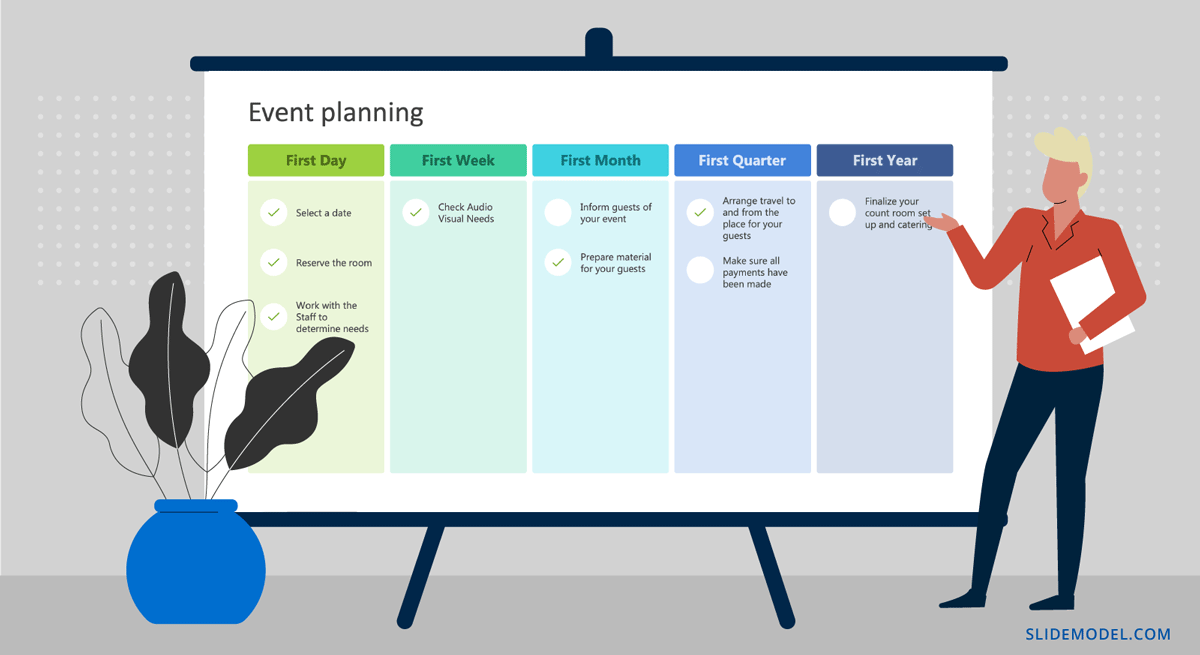
Event Planning Timeline Templates
Planning an event takes time; you need an event planning timeline template to use that time effectively. Show the team what’s expected at every milestone and when tasks and actions must be done.
Event planning timeline templates can be roadmaps, schedules, or Gantt charts. It all depends on your planning style.
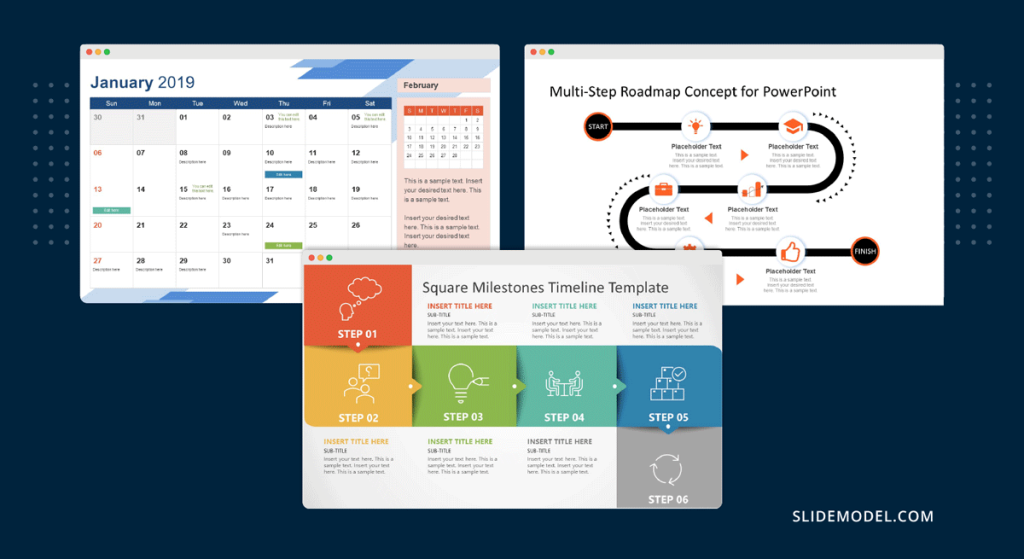
Event Plan Presentation Template
An event plan presentation template is a slide deck on which the event planner shares critical information about an event concept, event plan, budget, logistics, and more with an audience of investors, decision-makers, or sponsors.
Event Plan Proposal Presentation Template
Much like an event plan presentation, an event plan proposal highlights all the same concepts but as a proposal. This slide deck template pitches the event to the decision-makers who will say yes or no to the event going ahead.
This template will help with both an event plan and the event plan proposal:
Event Budget Templates
With an event budget template, you can forecast costs efficiently, always keeping track of fixed and variable costs and managing a contingency fund. These templates look like spreadsheets or tables that make it easy to see costs per item and the difference between the projected amount and the final cost.
Event Venue and Vendor Templates
Event venue and vendor templates cover all key elements, actions, and information about the event venue (the location) and the vendors hired to supply their services.
Event Registration Template
Some events, especially public ones, must be registered with local officials. Sometimes, the authorities will supply an event registration template for you to fill in, but occasionally you’ll have to create your own. An event registration template includes all key data about your event, like who is organizing it, how many people will attend, and who will clean up.
Attendee Registration Templates
Attendee registration differs per event type. Paid in-person events involve attendance fees and costs, free events might only need a signup list, and online events use digital forms for attendees to reserve a spot in the virtual meeting room.
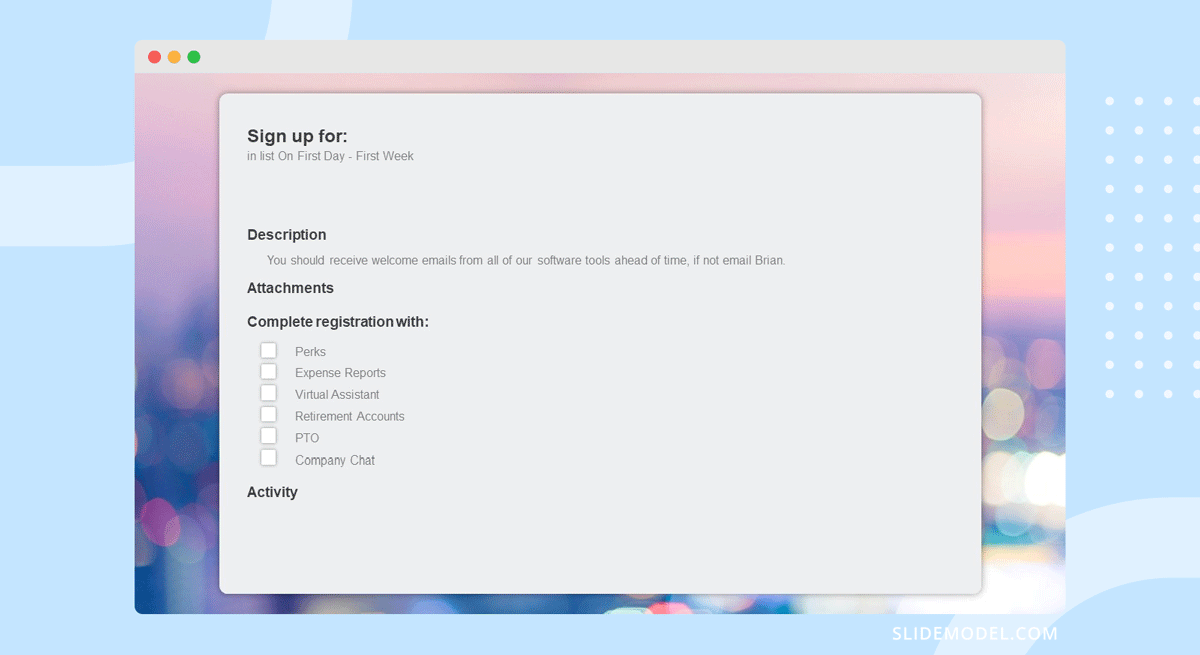
Event Speaker Checklist
An event speaker checklist can be internal for the event planning team or created specially for the speaker.
Internal event speaker checklists track all critical information like travel details and unique requirements. Use a list per speaker to ensure everything runs smoothly for them.
Checklists for the speaker ensure that they know what to expect and come prepared for their presentation.
Event Tech Checklist
All events involve tech of some sort, and to ensure everything is ready and working, you need an event tech checklist. Your specifics will differ according to what type of event you’re planning, but the idea is to keep track of all tech necessities on time for your event to succeed.
Event Agenda Template
Event agendas in your event plan match the overall presentation design, but the event agendas you give attendees are another story altogether. The agenda slide template for your plan or plan proposal covers what will happen during the event. The audience for that template is your team, decision-makers, sponsors, or partners.
The agenda template for your attendees is different. These agenda templates are eye-catching, inspiring, and worth taking home. Add your event brand assets along with your content to finish the design.
Event Sponsorship Templates
Event sponsorship templates will help your event planning team create a proposal that matches your event needs and style. You can use a simple proposal template that includes sections where you can specify the type of sponsorship per sponsor.
Another type of sponsorship template includes sponsorship packages with different price tags that contain lists of detailed items or opportunities included in each package.
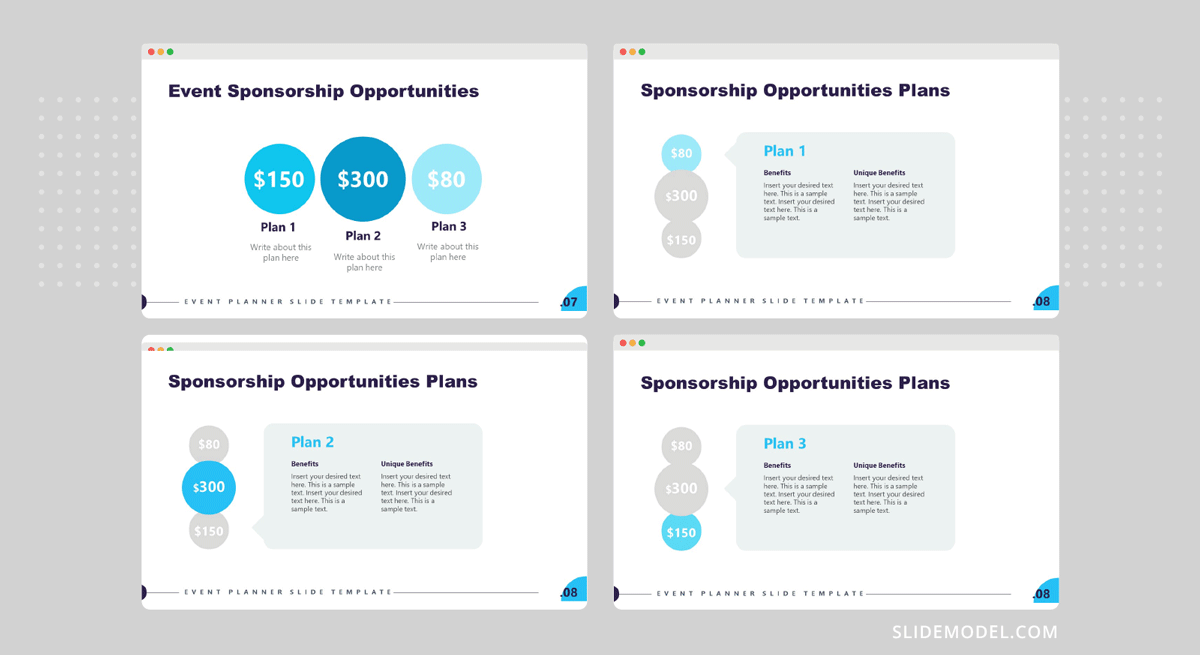
Event Feedback and Evaluation Templates
Event feedback and evaluation templates can be both internal and external. You can poll your event planning team and ask attendees for their feedback. Likewise, you can ask speakers, vendors, sponsors, and partners how they felt about the event.
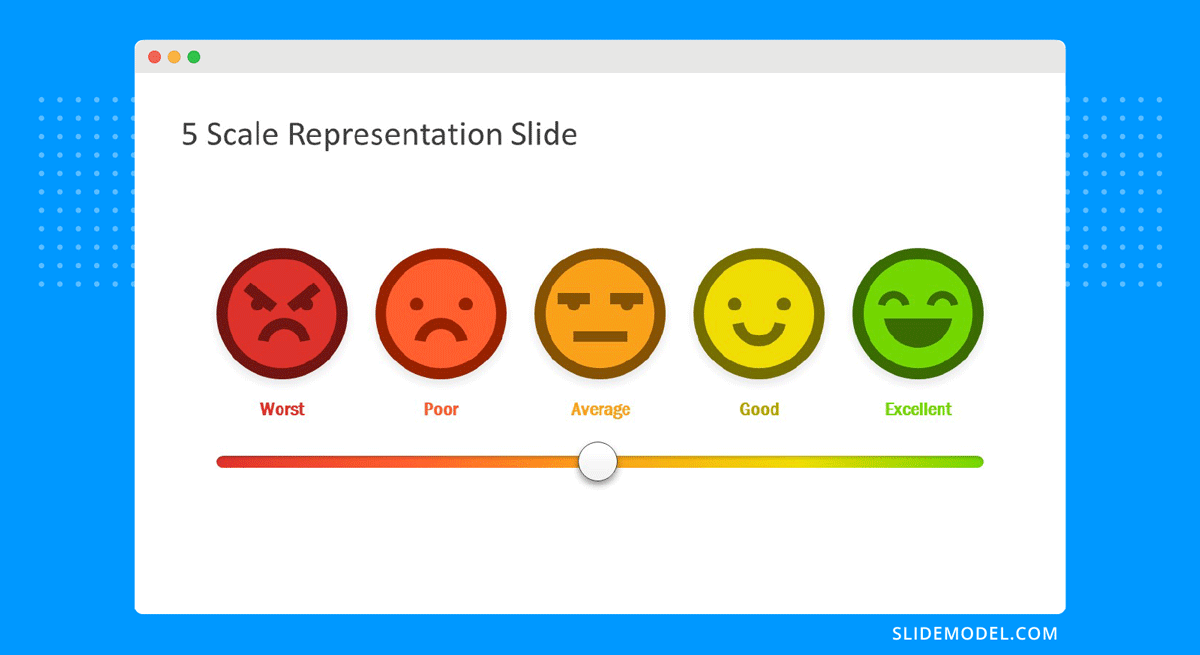
Case Study: Business Conference Event Plan
StellarCorp, a multinational manufacturing company with offices in three major cities, wishes to organize a leadership summit. Their in-house event management team has prepared an event plan proposal for StellarCorp CEOs to approve.
Discover the event plan proposal presentation that sealed the deal.
Cover: Key Event Details
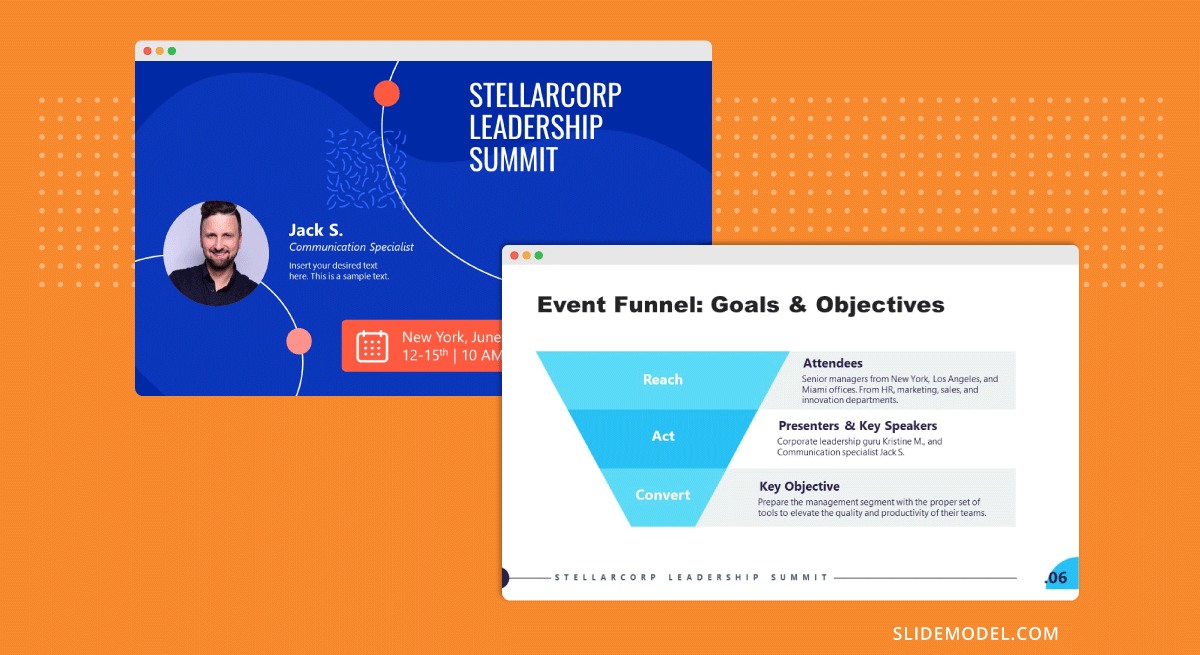
The cover is a welcome mat to the presentation and highlights the event name and key details.
StellarCorp Leadership Summit
Potential dates: June 12-15 or October 10-14, 2024
Location: New York
Attendees: Senior managers from New York, Los Angeles, and Miami offices. From HR, marketing, sales, and innovation departments.
Interested presenters and key speakers: Corporate leadership guru Kristine M. and Communication specialist Jack S.
Introduction: Purpose, Goal, and Objectives
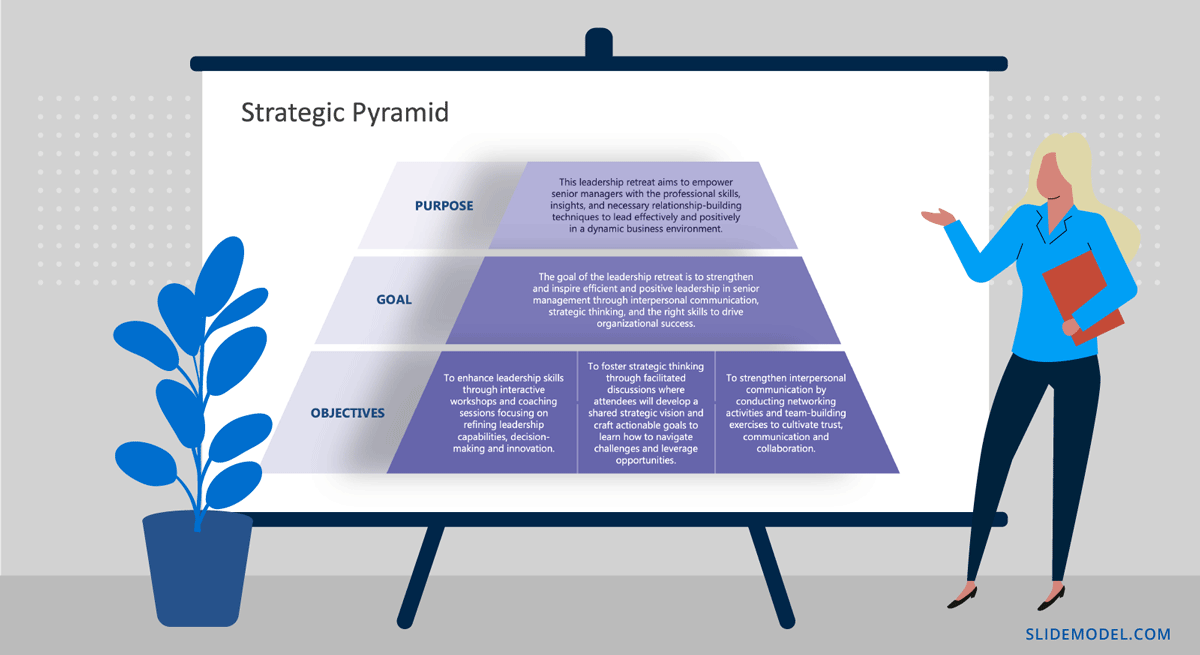
The presentation’s first slide highlights the event concept, purpose, goal, and objectives.
By sharing a clear hierarchy of purpose>goal>objectives in a pyramid design, the event planning team sets the stage for the rest of the presentation.
Purpose:
This leadership retreat aims to empower senior managers with the professional skills, insights, and necessary relationship-building techniques to lead effectively and positively in a dynamic business environment.
Goal:
The goal of the leadership retreat is to strengthen and inspire efficient and positive leadership in senior management through interpersonal communication, strategic thinking, and the right skills to drive organizational success.
3 Objectives:
- To enhance leadership skills through interactive workshops and coaching sessions focusing on refining leadership capabilities, decision-making, and innovation.
- To foster strategic thinking through facilitated discussions where attendees will develop a shared strategic vision and craft actionable goals to learn how to navigate challenges and leverage opportunities.
- To strengthen interpersonal communication by conducting networking activities and team-building exercises to cultivate trust, communication, and collaboration.
Event Plan Schedule with Milestones
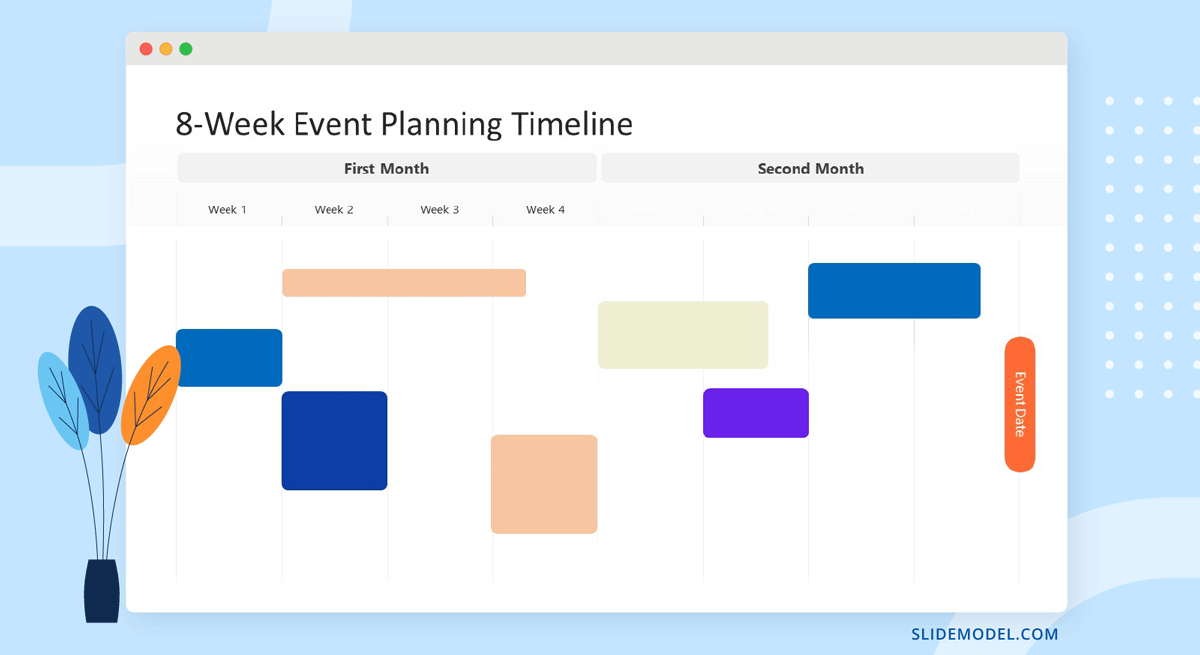
The following section in the event plan proposal is the event plan schedule highlighting key milestones. Showing this information to CEOs will give them an idea of how long the planning stage will take and if it’s feasible and aligned with their organizational goals.
Since the team has already done much of the work to create a plan proposal, the timeline starts with the CEOs signing off and covers the next two months of the planning activities.org chart.
- First Month ( with regular weekly team meetings to track progress, address any issues, and ensure collaboration among team members.)
- Week 1 milestone: Confirm target audience and finalize budget projections.
- Conduct a kickoff meeting with the event planning team to review the Leadership Summit’s purpose, objectives, and goals.
- Review the budget projection and financial plan.
- Confirm the target audience and expected number of attendees.
- Week 2 milestone: Finalize a venue
- Research and select suitable venues in each of the three major cities.
- Delegate venue negotiations and contract signing tasks to team members.
- Review and approve the selected venues.
- Week 3 milestone: Create a registration platform
- Develop a comprehensive agenda and program for the Leadership Summit.
- Identify and invite keynote speakers and workshop facilitators.
- Create a registration system and launch the website or registration platform.
- Week 4 milestone: Invite attendees
- Initiate promotional activities to generate awareness about the event with senior management.
- Review and approve the design and distribution of formal invitations.
- Week 1 milestone: Confirm target audience and finalize budget projections.
- Second Month (with regular weekly team meetings to track progress, address any issues, and ensure collaboration among team members.)
- Week 1 milestone: Confirm speakers and start venue logistics.
- Confirm speaker availability and finalize their session topics.
- Arrange audiovisual equipment, staging, and decor based on the venue requirements.
- Coordinate with catering services to plan meals and refreshments during the event.
- Week 2 milestone: Develop the communication plan.
- Design and produce event materials, badges, signage, and handouts.
- Develop a communication plan.
- Organize transportation arrangements for attendees, if needed.
- Week 3 milestone: Finalize vendor logistics
- Finalize logistics, including room setups, seating arrangements, and technical requirements.
- Coordinate with vendors for additional services, such as event security or photography.
- Week 4 milestone: Final review and handoff
- Conduct a comprehensive team run-through of the event schedule and logistics.
- Conduct a final review of all event materials and attendee lists.
- Prepare an event-day checklist and distribute it among the planning team.
- Handoff to the event management team for on-event activities.
- Week 1 milestone: Confirm speakers and start venue logistics.
The Team
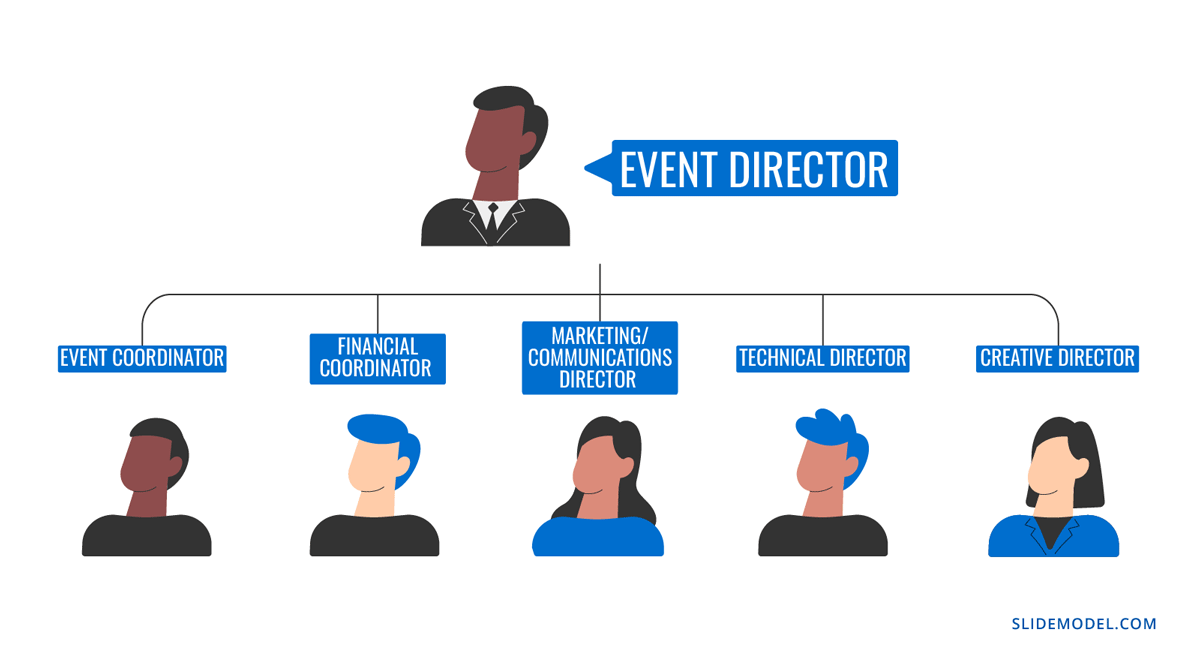
The next slide is all about presenting the event planning team. Team members and their roles are displayed using a hierarchical organizational chart, with the event director at the top and the other directors and coordinators on the second level. Team members for each section go below their leader’s column.
- Event Director (top of the org chart)
- Event Coordinator (second level)
- Financial Coordinator (second level)
- Marketing/Communications Director (second level)
- Technical Director (second level)
- Creative Director (second level)
Logistics Overview
Across one or two slides, the team shares a logistics overview, including all the event’s top-level details. All items are listed in a table separated into horizontal sections that cover details for the venue, f&b (food and beverages), and tech requirements.
Venue: NY Hotel Chain Conference Room
Attendee Registration: Online
Seating arrangements for seminars: audience
Seating arrangements for workshops: table groups
Parking facilities: Superpark
Accessibility: AccesNY
Accommodation: NY Hotel
Transportation: Uber
Tech: eventtech NY
- projectors
- computers
- speakers
Catering and Refreshments: Cater NY
- Allergies and dietary restrictions forms
Event materials and signage: NY design
Health and Safety measures: EventSafe
Budget Projection and Forecast
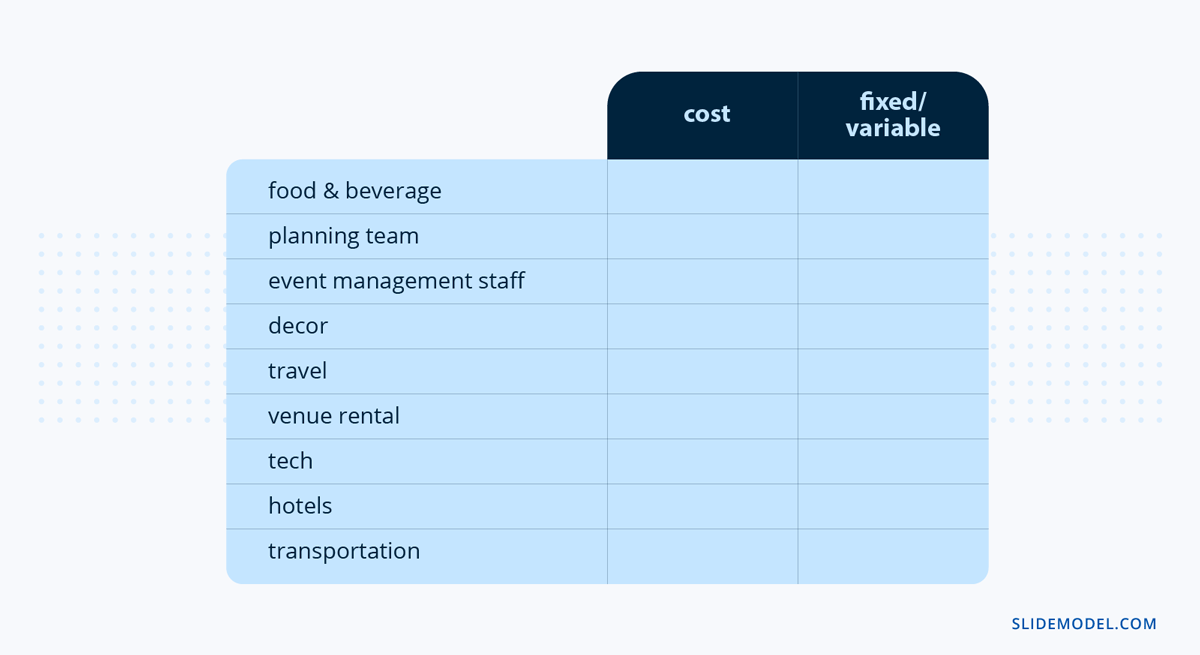
Next is the budget breakdown, with which the team shares a budget forecast and projection for all event costs. The budget table or sheets show prices for all the details, referencing whether the cost is fixed or variable. It also includes a contingency plan and a final estimated budget.
- Venue Expenses:
- Rental fees for event spaces: $10,000
- Additional charges for breakout rooms or meeting rooms: $3,000
- AV equipment rental and setup costs: $5,000
- Accommodation and Transportation:
- Hotel accommodations for attendees and speakers: $15,000
- Group rates or negotiated prices: $2,000
- Transportation services, including airport transfers and shuttles: $4,000
- Technology and Audiovisual:
- AV equipment rental, such as projectors, screens, and sound systems: $8,000
- Technical support and on-site technicians: $3,000
- Internet and wifi services: $2,000
- Catering and Refreshments:
- Food and beverage catering for meals, snacks, and refreshments: $20,000
- Special dietary requirements or customized menu options: $3,000
- Coffee breaks and beverage stations: $2,000
- Registration and Attendee Management:
- Online registration platform or software: $2,000
- Ticketing services and payment processing fees: $1,000
- Badge printing and lanyards: $1,500
- Event Materials and Signage:
- Printing and production of event materials (badges, programs, handouts): $3,000
- Signage and banners for venue branding and directional guidance: $2,000
- Promotional items or giveaways: $2,500
- Promotion:
- Promotional campaigns: $5,000
- Design and production of promotional materials: $3,000
- Health and Safety Measures:
- Sanitization stations and supplies: $1,500
- Health and safety signage and communication materials: $1,000
- Miscellaneous Expenses:
- Insurance coverage for the event: $1,500
- Permits and licenses: $1,000
- Staff and volunteer expenses: $2,500
- Contingency Fund:
- Allocate a portion (10%) of the total budget for unexpected expenses or changes: $10,000
- Total Estimated Budget: $115,500
The Event Program
The final slide in the event plan proposal is a draft of the event program. As of the day of the proposal, the team brings a short list of topics chosen with the HR team:
- “Leadership in the Digital Age”
- “Building High-Performing Teams”
- “Effective Communication Strategies for Leaders”
- “Innovation and Disruptive Leadership”
- “Leadership in Crisis Management”
- “Developing Emotional Intelligence for Leaders”
- “Leading with Purpose and Authenticity”
- “The Future of Leadership: Trends and Insights”
- “Driving Innovation and Change in Organizations”
- “Strategic Leadership for Business Growth”
Event Program for Stellar Corp Leadership Summit:
Day 1:
Morning Session:
– 8:00 AM – 9:00 AM: Registration and Welcome Refreshments
– 9:00 AM – 9:30 AM: Opening Ceremony and Welcome Address by CEO
– 9:30 AM – 10:30 AM: Keynote Speaker 1
– 10:30 AM – 11:00 AM: Networking Break
Mid-Morning Session:
– 11:00 AM – 12:00 PM: Panel Discussion
– 12:00 PM – 1:30 PM: Lunch Break
Afternoon Session:
– 1:30 PM – 2:30 PM: Interactive Workshop
– 2:30 PM – 3:30 PM: Keynote Speaker 2
– 3:30 PM – 4:00 PM: Networking Break
Late Afternoon Session:
– 4:00 PM – 5:30 PM: Breakout Sessions:
– 6:00 PM – 8:00 PM: Networking Reception and Dinner
Day 2:
Morning Session:
– 8:00 AM – 9:00 AM: Registration and Networking Breakfast
– 9:00 AM – 10:00 AM: Keynote Speaker 3
– 10:00 AM – 11:00 AM: Panel Discussion
– 11:00 AM – 11:30 AM: Networking Break
Mid-Morning Session:
– 11:30 AM – 12:30 PM: Interactive Workshop
– 12:30 PM – 2:00 PM: Lunch Break
Afternoon Session:
– 2:00 PM – 3:00 PM: Keynote Speaker 4
– 3:00 PM – 4:00 PM: Panel Discussion
– 4:00 PM – 4:30 PM: Networking Break
Late Afternoon Session:
– 4:30 PM – 6:00 PM: Breakout Sessions:
-6:30 PM – 8:30 PM: Gala Dinner and Awards Ceremony
Day 3:
Morning Session:
– 8:30 AM – 9:30 AM: Networking Breakfast
– 9:30 AM – 10:30 AM: Keynote Speaker 5
– 10:30 AM – 11:30 AM: Panel Discussion
– 11:30 AM – 12:00 PM: Networking Break
Mid-Morning Session:
– 12:00 PM – 1:00 PM: Interactive Workshop
– 1:00 PM – 2:30 PM: Lunch Break
Afternoon Session:
– 2:30 PM – 3:30 PM: Keynote Speaker 6
– 3:30 PM – 4:30 PM: Closing Keynote Speaker
– 4:30 PM – 5:00 PM: Closing Ceremony and Recap
– 5:00 PM onwards: Optional Networking Sessions and Farewell
Creative and Design
The event plan proposal ends with a draft of the creative and design material for the event itself and the promotional material to be sent out beforehand.
The mood board that served as inspiration for the event’s graphics is also listed in the presentation since it captures the ideas that CEOs must be in touch with to check if they represent the core values behind this event.
FAQs
How is event planning different from event management?
– Event Planning: Focuses on pre-event stages, including strategy, concept, and detailed planning.
– Event Management: Primarily deals with the execution and operational aspects during the event itself.
Why are event planning templates important?
Event planning templates streamline the planning process, save time, and reduce the risk of missing essential details. They ensure consistency, enhance productivity, and provide a framework for organizing events efficiently.
How should an event budget be structured?
– Fixed Costs: Venue rental, AV equipment.
– Variable Costs: Catering, transportation.
– Revenue Sources: Sponsorships, ticket sales.
– Contingency Fund: For unexpected expenses.
What is the purpose of an event program and agenda?
The event program and agenda detail the activities, schedules, and speaker sessions, ensuring that attendees and organizers are aligned on the flow of the event.
How can feedback improve future events?
Post-event feedback helps identify strengths, weaknesses, and areas for improvement. Use surveys, forms, or live feedback mechanisms to collect data from attendees, speakers, and stakeholders.
What are event sponsorship templates used for?
Event sponsorship templates help define sponsorship packages and benefits, making it easier to attract sponsors by presenting opportunities in a professional and structured manner.
Closing
The event planner reminds the CEOs that the Leadership Summit is vital for the company because when you take care of your people, your people take care of you.
The presentation ends on a high note with a thank you slide and a quote by Judy Allen, author of The Executive’s Guide to Corporate Events & Business Entertaining, “What sets your business function apart is not the amount of money you have to spend but how creatively you tap into your customers’ senses.”
Design and Plan Successful Events Every Time
In this guide, you learned just how essential event plan templates are when planning an event. There’s no reason to reinvent the wheel when all the resources are at your fingertips.
There’s one for every aspect of the planning process, from event plan checklist templates to registration form templates. Use SlideModel templates to plan, organize, present, and pitch amazing events every time.
